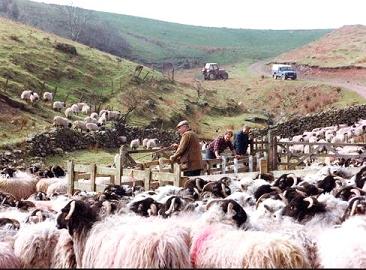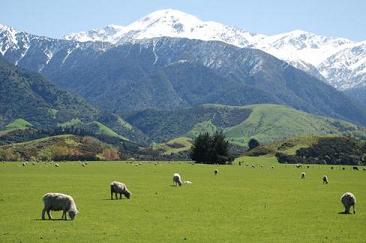.
Exporters and other middlemen profit as UK & NZ farmers are underpaid
 Picture from Cumbrian Commoners’ website
Picture from Cumbrian Commoners’ website
So often the BBC appears to be underpinning government trade policy – now Farming Today extols their export drive, sending Charlotte Smith to visit a cutting plant which handles over 20,000 lambs per week, meeting the export manager who divides his time between the factory, and trade stands across the world.
Meanwhile, we note that Britain imported 86,100 tonnes product weight of sheep meat in 2012.
.
Depressed prices
In April, Chief executive of the National Sheep Association (NSA) Phil Stocker records that the timings of NZ imports of legs and loins “caused a massive disruption in our domestic market”.
Head of trade development at Eblex Peter Hardwick told MeatInfo.co.uk that lamb from NZ had played a significant role on depressing the price of UK lamb “right through until the late autumn”. He said that they are importing lamb legs at a lower price and at a promotional time of the year. NZ January imports were up 77% and unit values 25% cheaper, 35% higher in volume than 2011 levels and 20% below 2011 levels in price – “a massive increase”.
As low prices dismay sheep farmers, they are told to ‘market them correctly’, by EBLEX; Welsh hill farmers point out that the price per kilo for lightweight and super-lightweight lambs has been well below the average price for lambs with higher weights that reach supermarket specification.
New Zealand sheep farmers are also suffering from poor prices
Hardwick thinks that NZ sold ‘unnecessarily weakly’ into the UK market, at levels that didn’t even give their farmers adequate returns.
Beef + Lamb New Zealand’s chairman Mike Petersen agrees, drawing attention to the struggle NZ farmers had been facing. He said sheep farmers in his country, such as those here in the UK, were also struggling with “unsustainable returns for lamb”,
As the export manager sells his Welsh lamb to Canada, Singapore, Ghana and France, production in Britain and New Zealand is undermined by the EXIM roundabout which underpays British and New Zealand farmers who make it all possible.
–

Recent Comments